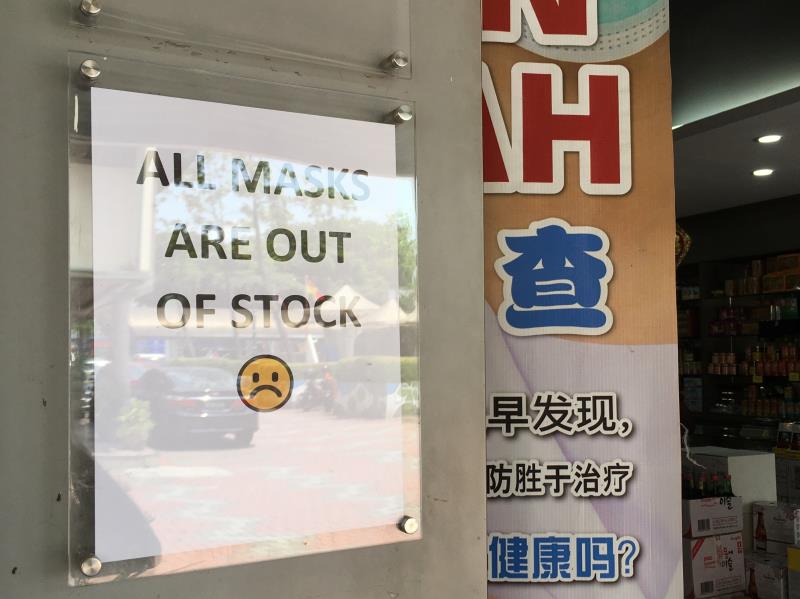COVID-19: Supply troubles leave independents out in the cold
Medical Writer
 A sign on display outside a community pharmacy in the Klang Valley area.
A sign on display outside a community pharmacy in the Klang Valley area.With public concern growing over the COVID-19 outbreak, one community pharmacy is wrestling with questionable supplier practices amidst overwhelming demand for face masks.
“We ran out of them 2 months ago, mainly due to the sudden surge of demand,” said Edna Loh, Unicare Pharmacy manager. “In January, we found that while stocks were available, they weren’t being supplied evenly to all the pharmacies.”
According to Loh, suppliers are prioritizing clients with existing contracts and those willing to sign new long-term ones.
“Usually we order based on future projections. It’s not enough for the kind of full-on contracts that hospitals or chain pharmacies can do with manufacturers,” said Loh.
Even when mask stocks were offered, she found prices greatly increased. While the Ministry of Domestic Trade and Consumer Affairs (KPDNHEP) has set a ceiling price of RM0.80 on individual three-ply masks at retail, wholesalers have demanded as much as RM1.10 per mask from Loh, citing import costs and sourcing issues.
Furthermore, many products were not up to acceptable manufacturing standards, with some appearing not even to have proper registration.
“We couldn’t accept those masks, even though we were told they were three-ply,” said Loh. “Some products we were willing to at least examine, even at a cost higher than the government’s retail ceiling price, but the suppliers refused to send us anything unless we paid upfront and took all of it. We were left with no choice but to refuse.”
Hand sanitizer supplies have been steadier, although wholesale prices have increased to almost twofold, with manufacturers claiming difficulties in sourcing raw materials and accelerated production costs.
In the meantime, masks—when available at all at her pharmacy—are rationed out to customers. Currently, the only type they have in stock are N95 masks, which she only receives in limited quantities.
“Much earlier on, we sold masks by the box, until we saw people buying 10–20 boxes at once. We had to think about nursing homes who also needed them from us,” said Loh. “We’ve tried to educate them about general prevention and hand hygiene, but most of them are already aware of the prevention tips. They just feel safer having masks.”
Loh’s team fields public complaints daily. Customers have brought up other pharmacies and online retailers where masks are available. Some have accused the pharmacy of hoarding supplies for themselves. Loh says they have no choice but to keep telling those customers that they can’t get them.
“The ones they see in the market, those are contracted. Their suppliers refuse to provide us any masks, saying A or B Pharmacy has already signed a contract for the whole year’s supply,” said Loh.
She has tried to contact the Malaysian Pharmaceutical Society (MPS) to look for solutions, but they haven’t been able to provide concrete answers, she says.
“I’d like to know how other independent pharmacies are coping. We’re all trying to serve the community,” she added. “There’s clearly a huge gap [in supply], the government is unable to give us an answer, and people are worried.”
Asked for comment, MPS president Amrahi Buang said, “The MPS was invited by KPDNHEP for an urgent meeting on 20 February 2020 to discuss the matter. The meeting was also attended by major hypermarts and one big chain pharmacy."
According to Amrahi, the MPS has proposed:
1. To lift price fixing because across the board, there are no face mask supplies even for staff use.
2. To increase local face mask manufacturing, both three-ply surgical and N95 types.
3. To ban face mask export to other countries.
4. For government to control supplies and supplies made to CPs only so that patients not only can get supplies but also education about COVID-19 infection, addressing symptoms, proper handwashing using soaps and proper hand sanitiser use.
“KPDNHEP has mentioned that it's up to the suppliers to control the supply of face masks to the consumers," said Amrahi.